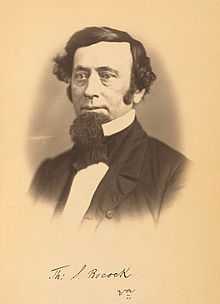Thomas S. Bocock
| Thomas Bocock | |
|---|---|
 | |
| Speaker of the Confederate States House of Representatives | |
| In office February 18, 1862 – May 10, 1865 | |
| Preceded by | Howell Cobb (President of the Provisional Congress) |
| Succeeded by | Position abolished |
| Member of the C.S. House of Representatives from Virginia's 5th district | |
| In office February 18, 1862 – May 10, 1865 | |
| Preceded by | Constituency established |
| Succeeded by | Constituency abolished |
| Member of the U.S. House of Representatives from Virginia's 5th district | |
| In office March 4, 1853 – March 4, 1861 | |
| Preceded by | Paulus Powell |
| Succeeded by | Robert Ridgway |
| Member of the U.S. House of Representatives from Virginia's 4th district | |
| In office March 4, 1847 – March 4, 1853 | |
| Preceded by | Edmund Hubard |
| Succeeded by | William Goode |
| Personal details | |
| Born | May 18, 1815 Buckingham, Virginia, US |
| Died | August 5, 1891 (aged 76) Appomattox County, Virginia, US |
| Political party | Democratic |
| Alma mater | Hampden–Sydney College |
Thomas Stanley Bocock (May 18, 1815 – August 5, 1891) was a nineteenth-century politician and lawyer from Virginia. After serving as an antebellum United States Congressman, he was the Speaker of the Confederate States House of Representatives during most of the American Civil War.
Biography
Born at Buckingham Court House in Buckingham, Virginia, Bocock was educated by private teachers as a child. He went on to graduate from Hampden–Sydney College in 1838, studied law and was admitted to the bar in 1840, commencing practice in Buckingham Court House. He was a member of the Virginia House of Delegates from 1842 to 1844 and was the prosecuting attorney for Appomattox County, Virginia, in 1845 and 1846.
Bocock was elected a Democrat to the United States House of Representatives in 1846, serving from 1847 to 1861. There he served as chairman of the Committee on Naval Affairs from 1853 to 1855 and again from 1857 to 1859. In 1859, Bocock was nominated for Speaker of the House, but withdrew after eight weeks of debate and multiple ballots failed to elect a speaker.[1] He spoke at the inauguration of the Washington Equine Statue in 1860.
Following the start of the Civil War and Virginia's secession, Bocock was elected a Democrat to the Confederate States House of Representatives in 1861, serving until the end of the war in 1865. He was a member of the unicameral Provisional Confederate Congress, as well as the succeeding First and Second Confederate Congresses. He was Speaker of the Confederate States House of Representatives from 1862 to 1865.
After the war ended, Bocock served in House of Delegates again from 1877 to 1879 and was a delegate to the Democratic National Convention in 1868, 1876 and 1880. He died in Appomattox County, Virginia, on August 5, 1891, and was interred at Old Bocock Cemetery near his plantation, "Wildway."
Elections
- 1847; Bocock was elected to the U.S. House of Representatives with 51.42% of the vote, defeating Whig Henry P. Irving.
- 1849; Bocock was re-elected with 53.04% of the vote, defeating Whig Irving.
- 1851; Bocock was re-elected with 63.49% of the vote, defeating Whig Phillip A. Bolling.
- 1853; Bocock was re-elected with 51.74% of the vote, defeating Whig John T. Wootton and Independent Thomas Hamlet Averett.
- 1855; Bocock was re-elected with 57.25% of the vote, defeating American Nathaniel C. Claiborne.
- 1857; Bocock was re-elected unopposed.
- 1859; Bocock was re-elected with 88.78% of the vote, defeating two Independents identified only as Speed and Boisseau.
References
- Thomas S. Bocock at the Biographical Directory of the United States Congress Retrieved on 2009-04-29
- "Thomas S. Bocock". Find a Grave. Retrieved 2009-04-29.
Notes
| United States House of Representatives | ||
|---|---|---|
| Preceded by Edmund Hubard |
Member of the U.S. House of Representatives from Virginia's 4th congressional district 1847–1853 |
Succeeded by William Goode |
| Preceded by Paulus Powell |
Member of the U.S. House of Representatives from Virginia's 5th congressional district 1853–1861 |
Succeeded by Robert Ridgway(1) |
| Confederate States House of Representatives | ||
| New constituency | Member of the C.S. House of Representatives from Virginia's 5th congressional district 1862–1865 |
Constituency abolished |
| Political offices | ||
| Preceded by Howell Cobb as President of the Provisional Confederate States Congress |
Speaker of the Confederate States House of Representatives 1862–1865 |
Position abolished |
| Notes and references | ||
| 1. Because of Virginia's secession, the House seat was vacant for almost nine years before Ridgway succeeded Bocock. | ||
| ||||||||||||||||
|
